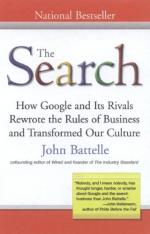
|
| Name: _________________________ | Period: ___________________ |
This test consists of 15 multiple choice questions and 5 short answer questions.
Multiple Choice Questions
1. How many advertiser relationships does Google have?
(a) Less than 100,000.
(b) Less than 50,000.
(c) More than a million.
(d) More than 225,000.
2. With which well-known director does Gross create IdeaLab, a company where his ideas can be put into action?
(a) Oliver Stone.
(b) Steven Spielberg.
(c) George Lucas.
(d) Ron Howard.
3. What percentage of search growth occurs in the U.S.?
(a) More than 40 percent per year.
(b) Close to 15 percent per year.
(c) Less than 10 percent per year.
(d) Close to 30 percent per year.
4. Who developed the first search engine for the World Wide Web?
(a) Alan Emtage.
(b) Matthew Gray.
(c) Brian Pinkerton.
(d) John Battelle.
5. What does Susan Wojcicki rent to Page and Brin for them to use to develop further technology?
(a) A garage.
(b) An office building.
(c) A computer lab.
(d) A room in her house.
6. When do Page and Brin adopt Gross' model?
(a) 2001.
(b) 2003.
(c) 2002.
(d) 2000.
7. What was the main problem with the way early Internet users were accessing files?
(a) They had to know the exact IP or DNS.
(b) It required a technical knowledge of advanced computer language.
(c) The files took too long to download after they were located.
(d) They didn't have the training necessary to access the files correctly.
8. What happens to prove that Google can generate billions of dollars in revenue from developing search engines and databases?
(a) They begin working with Amazon to direct more buyers to their search pages.
(b) They begin offering ad space for companies who own websites.
(c) They begin advertising the products of offline stores.
(d) They begin accepting payments for higher rankings in search results.
9. How does the media view Google in 2002?
(a) As an honest company.
(b) As a failing company.
(c) As a company that is growing too fast.
(d) As a deceitful company.
10. For what does Gross start charging advertisers?
(a) The number of Internet users who view their ads.
(b) A guaranteed number of visitors to their website per day.
(c) Keywords.
(d) Ad space located at the top of the Web page.
11. Before changing to Yahoo in 1995, what was the original name given to the search engine in 1994 by creators, Jerry Yang and David Filo?
(a) Yang and Filo's Web Crawler.
(b) YahooCrawler.com.
(c) Jerry and David's Excellent Search Engine.
(d) Jerry and David's Guide to the World Wide Web.
12. GoTo.com is founded on what line of thinking?
(a) Internet users will be willing to pay for a faster search engine with more targeted results.
(b) Advertisers will be willing to pay more to have paying customers directed to their websites instead of higher volumes of low-quality traffic.
(c) Internet users who have not made purchases online should be charged a service fee for using search engines.
(d) Advertisers who sell online products rely on incredible amounts of traffic to their websites to stay in business.
13. Who becomes the first CEO of Google?
(a) Larry Page.
(b) Eric Schmidt.
(c) Sergey Brin.
(d) John Battelle.
14. What business model does Battelle give Bill Gross credit for inventing?
(a) Selling an item to make as much of a profit as possible, reducing the total number of sold products needed.
(b) Using the Internet to generate the maximum number of sales from its users through personalized advertising.
(c) The combination of a small profit on individual transactions with a large volume of transactions.
(d) Requiring a small monthly membership fee for access to certain Internet features.
15. What component of a search engine sends information requests out on the Internet and collects the information gathered from websites?
(a) The clickstream.
(b) A crawler.
(c) Website link.
(d) A keyword.
Short Answer Questions
1. What does Google use as a backup in case the main plan to market keyword-based advertising fails?
2. When Louis Monier released AltaVista.com to Internet users, what company was he associated with?
3. Who does Page admire for doing noteworthy studies but never profiting from them?
4. Why does the press reject GoTo.com's business plan?
5. When Gross approaches Google to sell his plan, what happens?
|
This section contains 708 words (approx. 3 pages at 300 words per page) |

|




